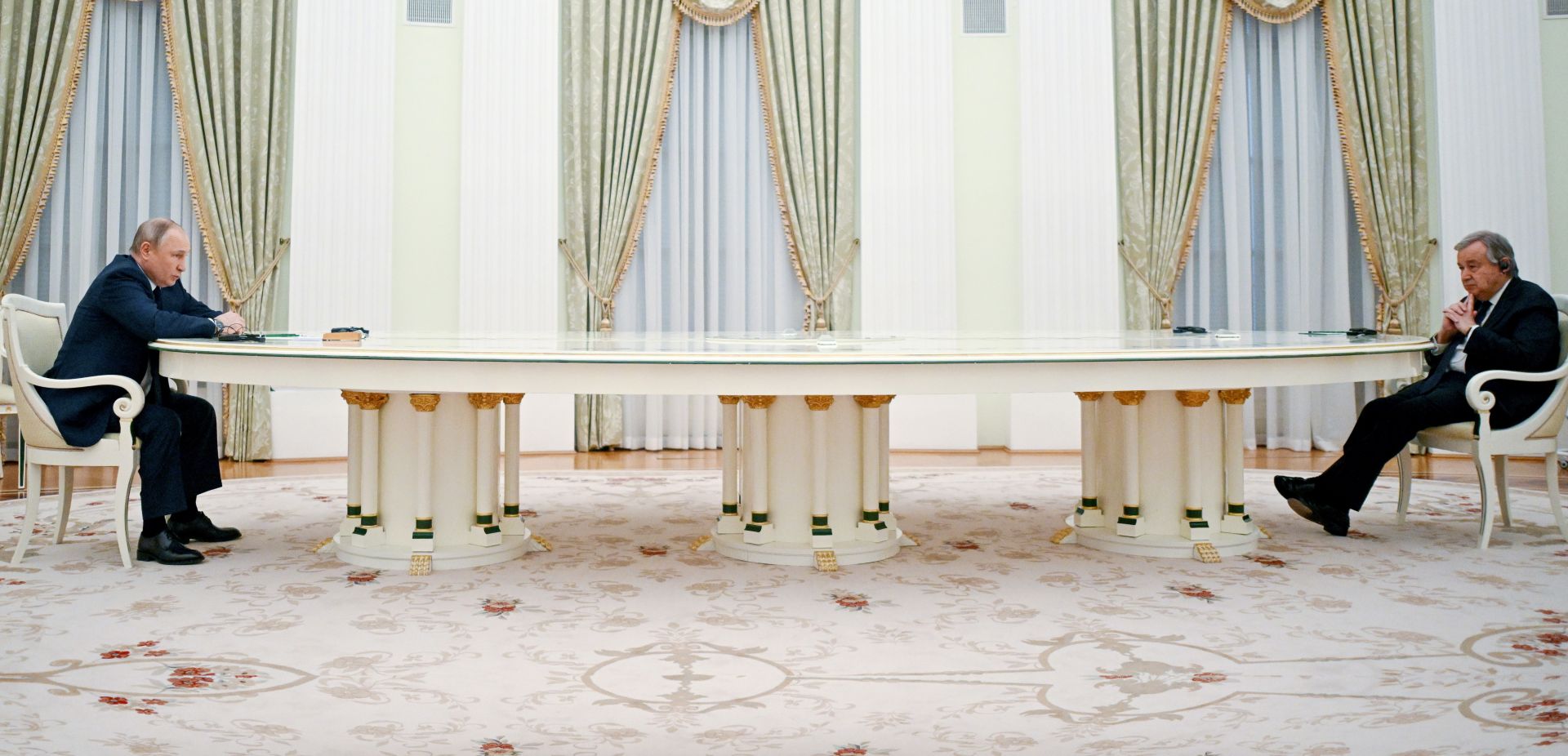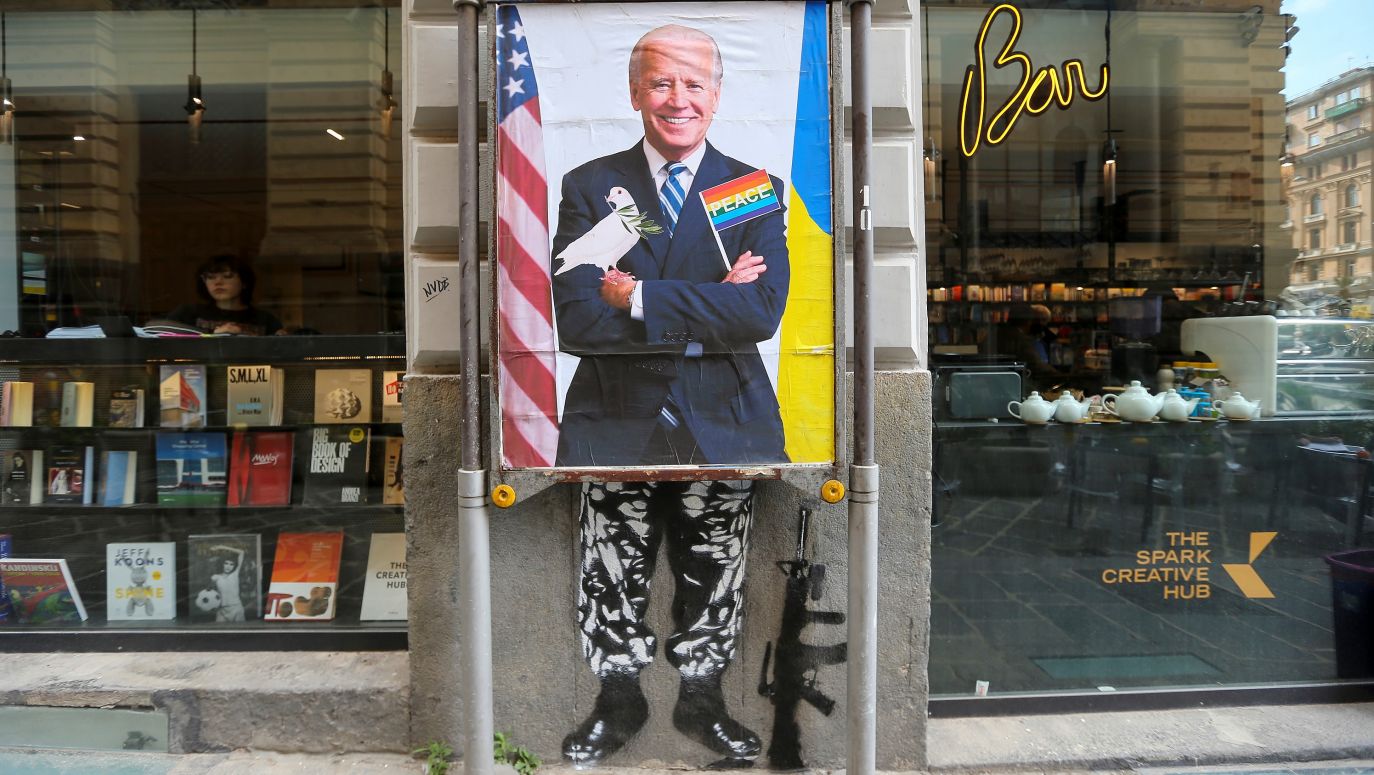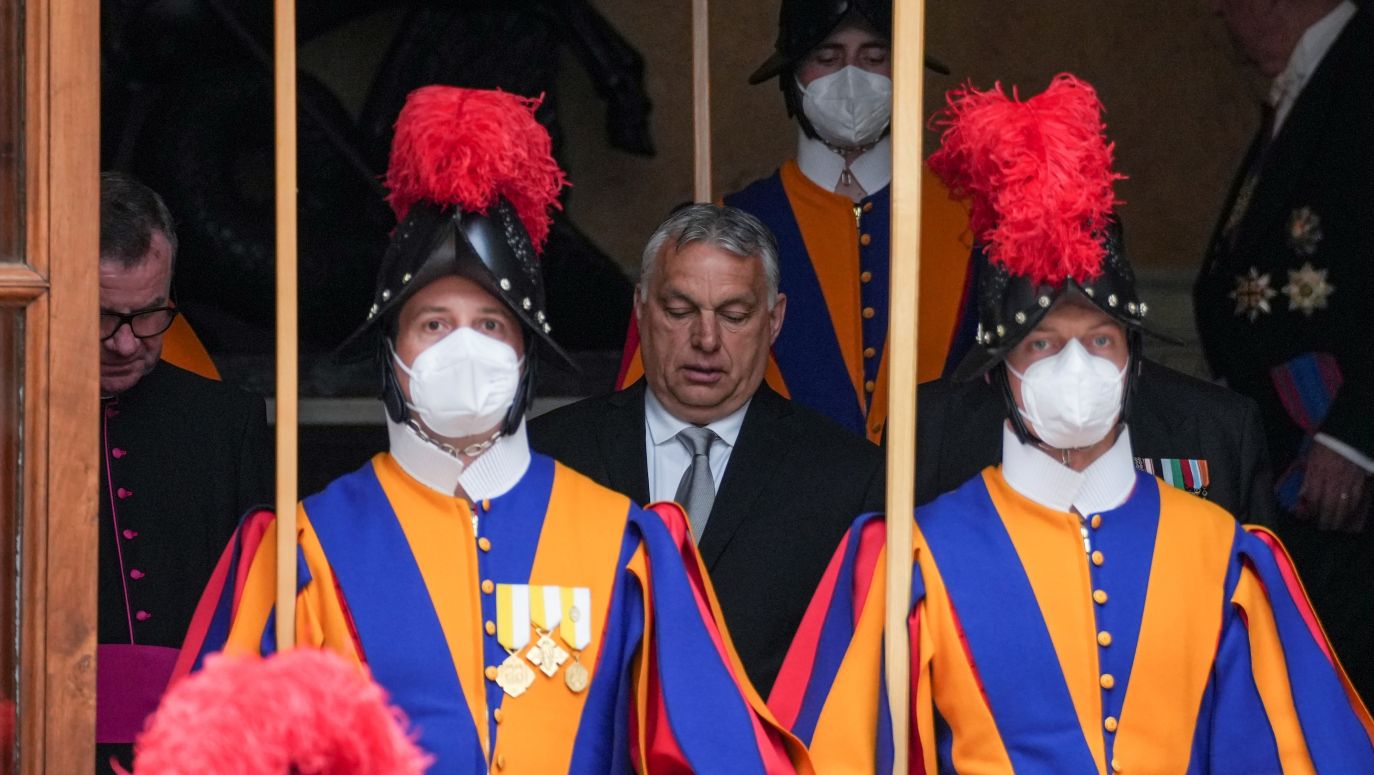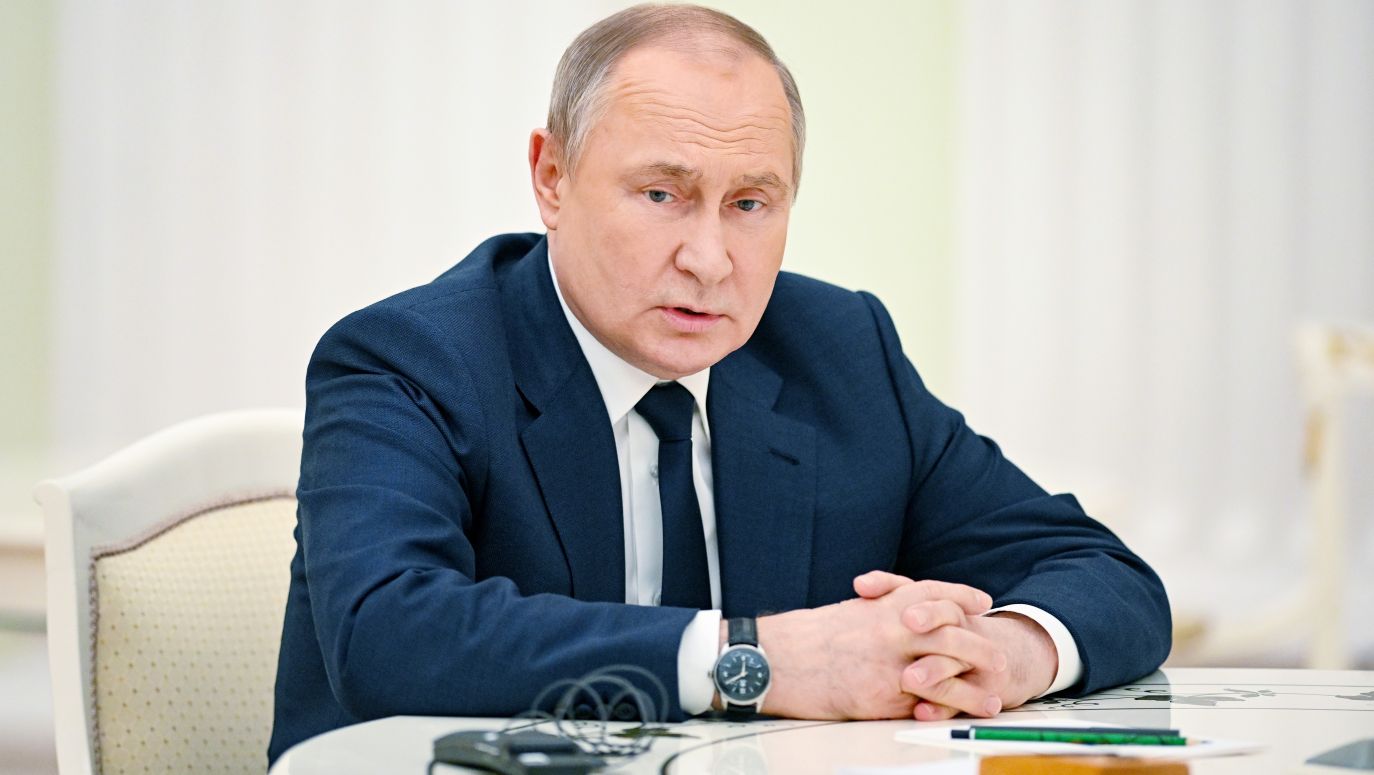The price of peace. What are we prepared to give Putin to put a stop to this terrible war?
11.05.2022
It depends on the interests of individual countries. Peace has a different value for a struggling for survival Ukraine, a different value for its Central and Eastern European allies and America, which is struggling for global leadership, and a different value for Germany and countries involved in risky business with the Kremlin.
The price of peace is constantly changing over time – the longer the fierce resistance of the Ukrainians goes on, the lower it becomes. It may also rise again if the war turns in the Russians’ favour or if they manage to drag it out over time.
At the start of the Russian aggression on 24 February 2022, when Ukraine’s chances of survival were estimated at only a few days, many Western countries were prepared to pay a small fortune to please Moscow: forfeit Ukrainian independence and perhaps even make concessions with regard to NATO’s eastern flank. Today, thanks to America’s strong involvement and in the face of a possible halt or even defeat of the Russians, there is far less talk about maintaining peace at any cost.
The stakes of this war are now different: it is not just a question of stopping Russia, but of driving it away from the West and, if successful, of destroying its military potential and weakening it permanently so that it would not threaten the security of Europe in the foreseeable future. So it is not only the future of Ukraine and Europe that is on the table, but also that of Russia itself.
This change of perspective is due, first and foremost, to the enormous persistence and efficiency of the Ukrainian defenders. It was thanks to them – and also as a result of fatal mistakes made by Moscow – that a completely different war scenario, favourable for Ukraine and the West, emerged. This hastened the decision on arms supplies to Kyiv, initially – in order not to irritate Moscow – overmodest and limited to “defensive weapons”, and later, with the Russians suffering heavy losses, increasingly broader: including heavy weapons, artillery and drones. The West (or at least part of it) came to believe that Moscow could be stopped.
Of course, none of this would have happened if it had not been for the determination of the states threatened by Russian aggression on NATO’s eastern flank – above all, Poland and the Baltic states – and the great support of the United States. From the very beginning, Washington has perceived the crisis around Ukraine as a global game played not only against Russia, but also against China. And it is well aware that the outcome of the current conflagration in Ukraine could have a decisive impact on America’s position in the world.
So cutting Moscow’s comb may not only curb the Kremlin’s barbarous inclinations, but also discourage China from challenging the world order in the Far East. In this situation, persistently seeking peace with Russia would be a mistake, unless Moscow decides to go back to square one and withdraw troops from Ukraine – which, however, is unlikely today.
Unconditional surrender
Russia still has large reserves of military manpower, which it will not hesitate to use as a last resort. It also has a powerful argument in the form of nuclear weapons, with which Kremlin propaganda relentlessly threatens the West. Finally, there are the economic dependencies in the energy sector, which prevent some European countries from taking a hard line on the Kremlin, and the still active and influential pro-Moscow circles in the West. Putin’s regime can therefore wait until the protracted war no longer arouses the interest of the West and begins to irritate the people there, who are longing for a return to normal life.
Of course, Moscow would also risk a lot, if it adopts such a strategy. A war of attrition could turn out to be much more dangerous for Russia itself, which has already been cut off from many sources of funding due to sanctions and is now on the brink of a serious economic crisis with yet unpredictable consequences. However, the logic of the Putin regime is suicidal and cannot be seen in rational, Western terms.
Moscow cannot simply withdraw from the war because the regime has invested in it its entire future and credibility. On that note, the threat of Russia using nuclear weapons, though hypothetically possible, would have to end in Moscow’s self-destruction. It seems, therefore, that the price of peace obtained under such circumstances could prove cost-ineffective even for lawless Russia.
As I write these words, Russia is trying to create faits accomplis. On occupied Ukrainian territory, the aggressors are setting up Russian administration and education, and the rouble is being put into circulation. At the same time, the civilian population is being subjected to repressive measures that have all the appearances of ethnic cleansing. The number of victims is estimated at tens of thousands, and nearly one million people have been deported deep into Russia.
All this means that the Moscow regime does not intend to leave the conquered territories; the only open question is whether the south-eastern Ukrainian regions of Luhansk, Donetsk, Kherson and Zaporizhia will be directly incorporated into Russia, as was previously done with Crimea, or whether some kind of puppet parastate will be established here, in the vein of the existing “people’s republics”. The former option, with full incorporation of the occupied territories into Russia, would mean that the possibility of making peace would significantly diminish, and its price – especially for Ukraine – would become politically difficult to bear.
Moscow has made no secret of the fact that its aim of dismantling the Ukrainian state is still valid. The Russians want to cut Ukraine off from the Black Sea, reach Odessa and Transnistria, vassalise or absorb Moldova, and then – as there are many indications – employ salami tactics: advance deep into Ukraine under any pretext. To this end, they may play around with short-lived ceasefires, after which they will – after replenishing their forces – resume the war.
No peace, apart from Ukraine’s unconditional surrender, is on Moscow’s mind today. The only significant difference between the situation two months ago and today is that the Kremlin already knows that Ukraine cannot be defeated within a few days. And that the war might have to be spread out over months or years.
Business as usual
In the face of this, quite likely, Moscow strategy, it will be a major challenge for the West to maintain cohesion. Although the last few weeks should fill us with moderate optimism, there is no guarantee that in the face of creeping, prolonged aggression, the West will be able to maintain its current, relatively uniform, attitude towards Russia.
We all know the weak links: Hungary, Austria, Italy, France, and Germany, and to a slightly lesser extent Belgium and the Netherlands. This “Moscow bloc” within the European Union is, of course, not homogeneous and the motives of its individual members vary.
Hungary stands out here, whose prime minister Viktor Orbán (like France’s Marine Le Pen and Italy’s Matteo Salvini) for years regarded Putin as a tactical ally in the fight against the liberal EU establishment – which in real politics translated into, among other things, Hungary’s enormous energy dependence on Russia. However, this does not seem to fully explain Orbán’s current policy towards Russia. In Budapest, where resentments around the Treaty of Trianon, which deprived Hungary of two-thirds of its territory over a century ago, are still strong, the prospect of undermining the current European order can seem quite alluring.
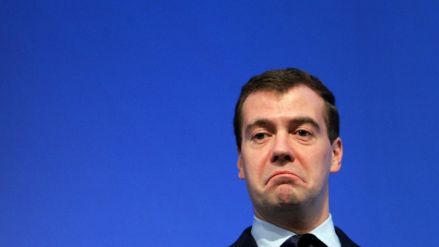
Has he been given the role of a new Zhirinovsky?
see more
It is possible that Putin has made Orbán an offer of territorial changes, for example concerning Carpathian Ruthenia, which used to belong to Hungary and is now part of Ukraine. And although this sounds like a conspiracy theory, it does not have to be one, given that a similar offer, but concerning eastern Galicia, was made by Putin to Donald Tusk in 2008. So if Orbán is indeed driven by revisionism, he is certainly not interested in defeating Russia. And he will not do anything that could realistically help Ukraine.
The other countries – which come from the old “Carolingian” Europe – are governed by different motivations. Here, Ukraine and, more broadly, the CEE countries have never been regarded as full members of the European community. Our region was rather seen as a buffer zone, something that lies between Russia and Europe and which, in the name of Western security, can always be the subject of negotiations and bargaining with Moscow. From this perspective, it is difficult to expect Paris, Rome or Berlin to risk their own peace of mind for the independence of Ukraine.
Two letters from “German intellectuals” addressed to the authorities in Berlin, in April, protesting against the plans to rearm Ukraine are a manifestation of this thinking. Their signatories demanded not only that the supply of arms to Ukraine be stopped, but also that Kyiv be forced to announce its immediate surrender. Those “intellectuals” used similar reasoning to Russian Foreign Minister Sergey Lavrov, claiming that laying down arms was the only way for Ukrainians to stop the bloodshed. In this way, the victim of the aggression was made responsible for the aggressor’s crimes, because the Ukrainians themselves are guilty of resisting Russia, which supposedly has every right to deprive them of their statehood.
It follows that both Hungary’s “revisionist” and Germany’s liberal, ultra-progressive elites have a similar view of Ukraine’s future. This similarity is not disturbed by any ideological differences, for its essence is the attitude to Russia, which is treated – completely against common sense – as an indispensable element of the European balance, keeping the troublesome buffer zone in check.
From this point of view, the best solution would simply be to divide Europe into two spheres of influence, with Ukraine, of course, coming under Russia’s wing. The fate of the CEE could be the subject of more detailed negotiations. It is worth noting here that this was precisely the offer made in the Russian ultimatum to America and NATO immediately before the outbreak of war in Ukraine.
So if peace depended on German intellectuals, Poles would today have Russian troops all along their eastern border. And possibly face the outbreak of another war, this time on their territory. One can only hope that this way of thinking does not become – as Moscow hopes – prevalent among the pacifist societies of Western Europe.
For now, Western governments are, to a greater or lesser extent, distancing themselves from such a defeatist rhetoric. However, the influence of pacifist elites is very visible, especially in Germany, where the increasingly confused Chancellor Olaf Scholz is trying to manoeuvre between the pro-Russian backing of his home SPD party, public fear of war in Europe, and common sense, which dictates opposing Moscow’s aggression until it is too late. Especially that not only peace is at stake, but also future international position of Germany, which has been badly damaged by Berlin’s servile policy towards Moscow over the past quarter of a century.
The Germans would like things to stay the same, but that is no longer possible. It is not possible to return to large-scale business with Russia and still play ball in Europe. By invading Ukraine, Moscow wanted to speed things up and in doing so destroyed meticulous German strategy. Nevertheless, not everyone in Germany and Europe came to terms with the new reality. Scholz has gone into hiding, hoping to wait out the worst, while Macron, taking advantage of Berlin’s weakness, is trying to take the lead in making deals with Russia.
All this is imbued with the fear of marginalisation. A united Europe, hitherto led by Berlin and Paris, has proved almost helpless in the face of the barbaric blow from the east. Had it not been for America’s firm stance, the price for peace would have been very high for our continent.
The EU would probably have to cave in to Moscow’s demands, surrender Ukraine to Russia and hand over political and military control of Central and Eastern Europe to Russia. Perhaps Russia would not even need a major war to achieve this. Raw mineral-resources blackmail, the threat of nuclear bombs and, only as a last resort, an armed attack on NATO’s eastern flank would suffice.
Biden: Putin, the insolent brat
The country that has thwarted Russian plans is the United States. Once again, it has been confirmed that the American political and military presence, although severely limited after the collapse of the USSR, remains the main, if not the only, guarantee for maintaining peace on our continent. Not surprisingly, Putin has for years sought to eliminate the Americans from Europe. Perhaps he knew, as a homely amateur historian, that it was the American resignation from guaranteeing the Versailles order after World War I that facilitated Hitler’s triumph and the outbreak of another world conflict.
The Kremlin was probably counting on the fact that the elderly Joe Biden would not have enough strength to deal with the situation in Europe in the face of the growing tensions with China. All the more so, as in the first months of his presidency Biden may have given that impression, for example by deciding to lift sanctions on the Nordstream 2 gas pipeline.
This is why some conspiracy theorists, such as the Russian economist Andrei Illarionov (a former Putin advisor now living in exile in America), believe that Biden deliberately provoked Moscow into war in order to settle it now on his own terms, and that Putin was caught out. However, little evidence can be found to support this hypothesis.
On the other hand, it can certainly be said that Joe Biden has turned out – contrary to Moscow’s calculations – to be an exceptionally uncomfortable politician for the Kremlin. Paradoxically, his first asset is his age. Nearly 80 years old, Joe Biden still remembers the times of the Cold War and is not at all paralysed by the vision of conflict with Russia. The second advantage is his political affiliation. A democrat who is firmly opposed to Russia is a much more difficult target for European progressive defeatists than Donald Trump.
If the widely-hated Trump was still sitting in the White House in the current situation, it would be easy to destroy him with accusations of insanity, irresponsible escalation, warmongering, etc. With a “liberal ally” like Biden, this is no longer so simple, which leaves the current president with far more leeway to act against Russia than his predecessor would have had.

Irena Lasota: More than 30 years have passed since the end of the PRL [Polish People’s Republic] and the habit of polemicizing still hasn’t developed in Poland.
see more
The situation is slightly different in America itself, where the radical wing of Trumpists is ready – for the sake of internal struggle – to reach for isolationist slogans and undermine the “boisterous” strategy of Biden, thus working in favour of the Russians. The first test of public mood in America will be the November elections to Congress, before which the Republicans have an advantage in the polls and the results of which are eagerly awaited in the Kremlin.
But pressure from Republican radicals is unlikely to significantly change the White House’s foreign policy, although time certainly plays a role – the sooner the Russian threat is eliminated, the better for the current Democratic team. Joe Biden, like all Democrats, sincerely loathes Putin. Not only for ideological reasons (Putin being an enemy of liberal democracy), but also because of the Kremlin’s alleged interference in the 2016 US presidential election in favour of Trump.
Putin, in Biden’s eyes, is an insolent brat who has allowed himself too much and should now be exemplarily disciplined for it. While in Poland, Biden explicitly called Putin a “war criminal”. Macron and Scholz would never dare to do that in public. Instead, they would politely seek opportunities to negotiate, while Putin, emboldened by their helplessness, would laugh in their faces.
The United States sees the conflict in Ukraine in a much broader perspective than the Europeans do. Biden knows that the Russian aggression is a kind of test of the Western world’s strength and cohesion, which Moscow’s friend China is watching with great attention. If Russia wins, China will have an easier path to invade Taiwan and undermine American leadership in the Pacific.
The United States does not intend to allow this to happen, which means that it must defeat Moscow. That is why, unlike France or Germany, they do not care about peace at any price. Washington wants – as the head of the Pentagon, Lloyd Austin, has openly admitted – to weaken Russia to such an extent that it will no longer be able to mount similar aggression.
The United Kingdom stands behind America because, in accordance with its strategy, it bases its security on the alliance with the USA and on the balance in Europe. Anyone who threatens this balance, and today it is Russia, is considered a threat by the British. In the current context it is also easier to see how Brexit has weakened the self-preservation instinct of the European Union, which in the face of Russian aggression has become dependent on the unstable “leadership” of Berlin and Paris.
By attacking Ukraine, Putin wanted to bring about a change in the existing world order, so that Russia and later China would benefit from it. However, a war under these circumstances has led to a completely different outcome, because the Americans, who have not yet been particularly interested in the post-Soviet area, have inevitably recognised Ukraine as a zone of their strategic interests. In this sense, the war in Ukraine is indeed a proxy war, but not only between America and Russia, but also between America and China.
It is therefore difficult to expect the United States to give up easily. For Moscow the war is, as I said, a question of credibility and even survival of its regime, but for America the stakes are not much lower. What is at stake is global security and the leadership of the United States, which is understood not only by the ruling Democrats, but also by many Republicans – no matter how fierce the internal American disputes are. So there is no question of handing over the whole of Ukraine to Russia.
